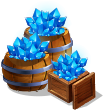Vol.4, Extra 1, P.1
Rain.
Upon a night colder than cold—rain.
Pitter, patter.
Unto skin cold to the touch—rain.
Sting, stab.
The boy remembered it then: “sleet” someone called it once.
Under eaves he was sat. Eaves slender and slipshod, of a shanty made from wasted and withered wood, upon a frigid and forlorn alleyway. Poor shelter it served; through its planks did rain freely pass, pricking the boy’s back as he huddled in hate.
Yes, of course.
Hate.
Hot were his eyes with them. White were his knuckles with them. How he hated this world—all the wicked and warmthless world about him.
Some others were also present. Children all, frail and forsaken. Amongst them, another boy laid limp upon the dirt. Thin he was, through and through, his body reduced by disease and destitution, a candle coughing out its last wisps of warmth.
His had been an unloved, unblessed life. A life spent loathing those that were. Living shoulder-to-shoulder with others who shared his lot was perhaps the only light he ever knew.
And there, lying and looking up at the unrelenting rain, he closed his eyes.
Never to open them again.
∵
Rree, rree.
Upon a night calm and quiet—crickets.
“Tch…”
Sigmund had quitted his bed. From the latticed window he looked. All the night outside seemed serene, scented and soft with moonshine—a whole other world to the night of sleet so long ago. Yet not even this serenity could silence the nightmare memory. For even in dream was the sleet oh so cold.
And even now could he hear it; the pitter-patter, playing in his ears.
“Mm…”
And upon the bed, there turned in his sleep a child: Arno, a boy from the neighbourhood. From certain death had Sigmund saved him once, and from then on, ever did Arno follow at the heels of his hero—though much to the latter’s annoyance. But today had found the boy rather insistent, that he should stay the night here in spite of all objection from that very hero of his. Relenting, Sigmund had set out another bed-mat for the mischievous urchin. But stealthily dispensing with it, Arno had sneaked himself to Sigmund’s slumbering side anyway.
“Hmph…”
Finally home at Hensen Sigmund was, from the battles at Tallien and Balasthea. Yet, bathing in such peace though he was, the man but shook his head and gave half a scoff. And the look on his face seemed dry and aloof as it ever was.
∵
Daily training.
Beneath unbroken sunshine swept and swung Sigmund’s wooden waster, whilst sat anear upon the grasses was a mirthful Arno. There, the boy fidgeted and frolicked as children his age were wont to do, whilst watching with intent his hero labouring away. For his part, Sigmund understood not in the least what could be so entertaining about this routine of his, and so inly grumbled away at the riddle all the while.
“Tch,” he clucked out of the blue. “Bloody thing… Ain’t right in the ’ands…”
Arno halted for a moment. “The sword?” he asked.
“Aye, wot else?” Sigmund answered sternly, his waster swinging yet away. Indeed, each stroke of it whooshed strong in the afternoon air, one after the other, all whilst sweat steamed from the swordsman’s bare arms and bosom like morning mists from a mountain. Despite the fervour of his training, however, Sigmund was dissatisfied: something just felt off about this brand new waster.
“What about loq, lo, loquack wood?” Arno said clumsily. “It’s good for wasters. A guard told me so!”
“Wot? Loquat?” Sigmund corrected him, before giving a shake of the head. “Eh, I’ll pass on that prissy shite. Giz white oak—aye, now that be fine wood for a waster.”
“Ooh,” Arno uttered in wonder.
“Oi—wot time ya thinks it is, ah?” griped Sigmund. “Get ya ’ome ’ready, ya li’l rascal. Fun an’ games this ain’t.”
Arno heeded not his annoyed hero. In fact, the boy but righted himself from all the rolling in the grass, stood up, and smiled full at Sigmund. “Oak!” he brightly said. “There’s oak there yonder, I remember! A big one, long and stinky! Come on, let’s go fetch it!”
“Peh. I ain’t fetchin’ bugger all,” refused Sigmund. “An’ ain’t ev’ry oak makes for good craftin’, ’nyways—’specially no niffy ones!”
“Come on, Big Sig!” Arno insisted. “Just a look!”
“Ach, to ’ome with ya, I said!” barked Sigmund. And amidst the noisiness echoing under the orange sky, there came walking nigh another Nafíl.
“Herr Sig,” greeted he. “I see my son’s no less a handful today.”
“All right, Paul,” Sigmund greeted back. “It be ’igh time ya pry’d ’im off me boots.”
“Bweh,” Arno objected, sticking out his tongue. “But it’s still early!”
“Now, now, Arno,” Paul said firmly. “We can’t bother the Herr in his hard training, now, can we?”
And so, lugged away by his father like a sad sack of potatoes, Arno finally went home. The sky goldened, the quiet returned, and Sigmund gruffly huffed.
∵
The next day.
Chill it was. Skies hung hoar and heavy, ready to weep at any moment. Sigmund stood in his home, looking out from the back window. Almost could he hear the sleet again. Almost could he feel it stabbing his skin.
“…”
He was silent. Nay, everything was silent, for Arno was not here. Passing seldom for the boy not to come by on a given day, if even briefly. The peace and quiet ought have soothed Sigmund’s nerves, but strangely enough, the man found himself ill at ease.
Knock, knock.
“Herr Sig?” said a soft voice outside. “Are you home?” Opening the front door, Sigmund found standing afore him Arno’s father, Paul. “There you are, good Herr,” he greeted. “That son of mine hasn’t come ’round here again, has he?”
“No,” answered Sigmund. “Not today.”
“Ah, I… I see,” said Paul. Dusk was nigh, and yet, as he then explained, his son had not been seen since just past noon. Here and there wavered the father’s eyes; it was clear he was very worried. Who could blame him? After all, Arno was once victim to the evils of Londosius, taken captive and made to suffer unspeakable cruelties. What a miracle it was, truly, for so small a boy to be saved and sent back into his father’s arms. And so it was that Paul, now all the wiser, cared double-deeply for his son—triply so, now that the little one was missing.
“What mischief is he up to now, I wonder…” Paul muttered. “Full-healed he’s not yet. The wound—it haunts him at the worst of times…” One of those times being days as cold as today. Worse still, rain now seemed fully fain to fall. “Ah, right!” Paul said, snapping his fingers. “The fallen oak! It’s yesterday when he mentioned it, or?”
“Hm? Ah, aye, that,” answered Sigmund, steeped in some other thought.
“Th-that is well!” Paul said, nodded. “I must go, then! Good day!”
Off the father trotted. Off to the fólkheimr’s gates and out to the thickets anear, where did lie the oaken tree as his son had told of. Sigmund stood at his porch, watching Paul disappear out of sight. And then up he looked—up to the grumbling grey.
“…”
∵
“Ah… ow…”
A muted little cry, sounding from atop a knoll. Here and there bloomed purple perennials, and in their midst was a boy: Arno, couched and moaning as he nursed his foot, which was now swollen with a scarlet welt.
“Ech…”
Sweat clung to every corner of his face as it puckered in pain. This was nary a knoll to be feared, usually. Yet, to a child like Arno, even things benign could prove a bane. In fact, as it happened, it had been but a bumblebee that had stung his ankle full-sore.
The situation was growing rather grim. An adult could yet walk with such a wound, yet little Arno’s poor and panging foot could dare not even another step. What’s more, this very knoll laid far opposite of the fallen oak to which his father had headed. Help, then, seemed beyond hope.
“Ah…!”
—Bvvoon.
To the boy’s ear, the buzz of a bumblebee sounded more like a blowing horn. Blenching back, Arno dragged his unresponsive foot and attempted to crawl away in escape. But the bumblebee brooked it not: to right below his face it flew, and there it hovered, as though to glower at him.
Arno flinched again and shrank back. But try as he might, the bee, the buzzing would not leave him alone. And there, the boy remembered it again: a feeling, nigh-forgotten, taking form and frothing up anew.
Fear.
But also: frustration.
Not without pampering and protection could a child hope to live—such a truth stung him harder now than had the bee’s stinger.
“Afh… hufh…”
Still, the boy stirred himself to action and attempted to flee once more. But in an instant, the buzzing blared revoltingly closer, right next to his lobes. The bee then whizzed straight at the boy’s face, and cowed by the critter, Arno winced and shut his eyes.
“Uwah…!”
From Arno: a shrill, short and shuddering. Yet in unison, there soughed a whoosh of air—fyoo!—so very distinct from the bumbling of the bee. Like a breeze it blew, strangely gentle against the boy’s cheek, and when it had passed, so, too, had the bumbling and the buzzing.
“Wha…?”
Timorously, Arno opened his eyes. Afore him, upon petals of purple, was the bee lying cleft in twain. And anear, there loomed a wooden waster. The boy’s eyes followed it up to its wielder’s face, which towered high above him and looked as annoyed as ever. And there the boy cried out:
“B… Big Sig!”
───────── ∵ ─────────











Comment (0)